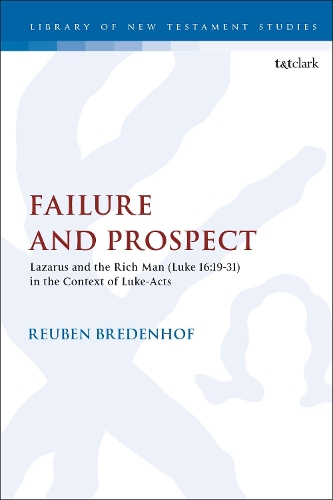
Failure and Prospect: Lazarus and the Rich Man (Luke 16:19-31) in the Context of Luke-Acts
(Paperback)
Available Formats
Publishing Details
Failure and Prospect: Lazarus and the Rich Man (Luke 16:19-31) in the Context of Luke-Acts
By (Author) Rev. Dr. Reuben Bredenhof
Bloomsbury Publishing PLC
T.& T.Clark Ltd
25th June 2020
United Kingdom
Classifications
Tertiary Education
Non Fiction
Criticism and exegesis of sacred texts
226.806
Physical Properties
Paperback
264
Width 156mm, Height 234mm
372g
Description
Bredenhof analyses the parable of Lazarus and the Rich Man (Luke 16:19-31) by examining its functions as a narrative, considering its persuasiveness as a rhetorical unit, and situating it within a Graeco-Roman and Jewish intertextual conversation on the themes of wealth and poverty, and authoritative revelation. The parable portrays the consequences of the rich mans failure to respond to the suffering of Lazarus. Bredenhof argues that the parable offers its audience a prospect for alternative outcomes, in response both to poverty and to a person who has risen from the dead. This prospect is particularly evident when the parable is read in anticipation of the ethical and theological concerns of Lukes second volume in Acts. Bredenhof asserts that reading within the context of Luke-Acts contributes to the understanding of Lukes purposes with this narrative. It is in Acts that his audience witnesses the parables message about mercy being applied through charitable initiatives in the community of believers, while the Acts accounts of preaching and teaching demonstrate that a true reading of Moses and the prophets is inseparably joined to the believing acceptance of one risen from the dead. Through a re-reading of Luke 16:19-31 in its Luke-Acts context, its message is amplified and commended to the parables audience for their response.
Reviews
This book will be useful for NT scholars interested in combining literary approaches, reading a narrative unit within the context of its corpus, or seeing clear examples of literary methodologies in action. * Bulletin for Biblical Research *
Author Bio
Reuben Bredenhof is currently the pastor of the Mount Nasura Free Reformed Church in Western Australia. His research interests include gospel studies, parable interpretation, and the Bible and culture.
